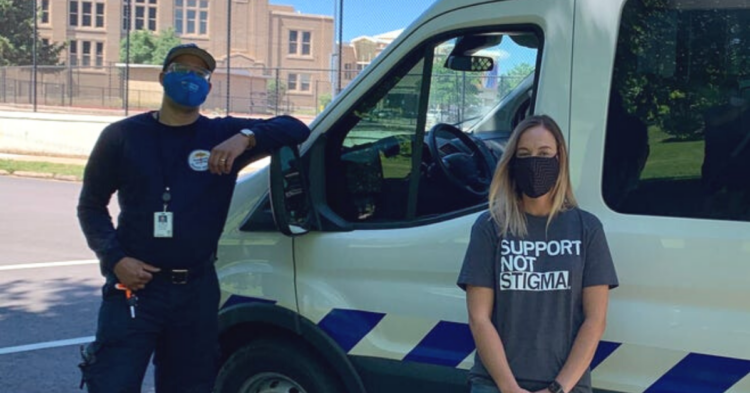In the wake of nationwide protests against police brutality and racial injustice, many law enforcement agencies around the country have been reviewing their practices and policies, as well as trying out some new ways of interacting with and responding to troubles in the communities they serve.
Some were thinking about such things even before the George Floyd protests, however. In Newark, New Jersey , for example, police have embraced de-escalation training and as a result, the department went an entire calendar year without even a single officer having to fire a single shot while on duty.
And in Denver, Colorado, another program aimed at better serving the community is already showing some wonderfully promising signs.
For several years, police in Denver have brought mental health professionals along on calls.
But in the STAR program, launched June 1, 2020, mental health workers respond to calls without any police support. The worker has only a paramedic along for the ride.
The key to the STAR program is the types of calls they’re sent out to: non-violent behavioral issues, trespasses and substance use, all the sorts of things where police officers with guns might escalate things unnecessarily, and which in the past they would have had to answer all the same.
The approach is quite different from traditional policing.
The plain white van the pair drive around the city has no lights or sirens; it’s outfitted with things like first aid supplies, snacks, condoms, water — little things that the people they help out might need. And what they don’t have, they can help the people they respond to access in the social services system.
“The STAR program is something entirely new. I feel like we’re filling a void that’s been empty for a long time,” Spencer Lee, a paramedic who works with the STAR program told 9News . “I’m not there to enforce the law. I’m not going to people committing crimes. I’m there to assess and figure out how I can help you.”
The STAR van is based on a similar program that has been in place in Eugene, Oregon, for 30 years.

Before beginning the STAR program, a team from Denver traveled to Oregon to study their operation, called Cahoots (Crisis Assistance Helping Out On The Streets). Of course, Eugene is a city of 168,00 people; Denver is on another level entirely. Nevertheless, Denver Police Chief Paul Pazen gave the program the green light.
“My belief is that this is the future of policing,” he told 9News. “We are talking about making sure that we have the best response for individuals in need. Sometimes that doesn’t involve a uniformed police officer.”
Six months in, the STAR program has already shown its value.
To be sure, the STAR van has been busy, responding to an average of six incidents a day from 10 am to 6 pm, Monday to Friday, Denverite reported.
In total, the team responded to 748 incidents over those first six months, and they needed to call upon police for backup exactly zero times. Not one incident required an arrest or jail time.
In fact, in some cases, police have called upon STAR to respond rather than the other way around.
Carleigh Sailon, a mental health professional who works in the STAR van, told Denverite that she could recall one case where police requested them at a 7-Eleven where a woman was having a mental health issue.
“We got there and told police they could leave. We didn’t need them there,” she said. And while she and her partner helped the woman access a day shelter for food, the police were able to go back to their day.
“So we were sort of able to solve those problems in the moment for her and got the police back in service, dealing with a law enforcement call,” Sailon said.
And for Pazen, that’s a huge deal.
Not only do those in need get the right kind of help and not have to enter the justice system, but police officers can just fight crime.
“I want the police department to focus on police issues,” he told Denverite. “We have more than enough work with regards to violent crime, property crime and traffic safety, and if something like STAR or any other support system can lighten the load on mental health calls for service, substance abuse calls for service, and low-level issues, that frees up law enforcement to address crime issues.”
The success of the STAR program so far suggests that it’s due to expand in the near future as well.
Pazen told Denverite that another $3 million in funds have been earmarked to help the STAR program add more workers and more vans so that they can respond to more calls, and not just during weekday business hours.

















































